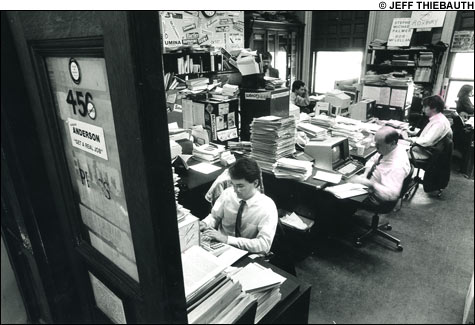If the Globe shrinks, will Beacon Hill run amok?
By ADAM REILLY | June 19, 2009

PAPER TRAIL In happier times, the State House Press Room was abuzz with reporters. Today, it's a moribund shell of its former self. |
The ongoing crisis at the Boston Globe shouldn't be troubling just to devotees of the sports pages and "Coupling." Citizens who prize strong coverage of the Massachusetts State House ought to be fretting over the paper's fate, too. With its four-person State House contingent — bureau chief Frank Phillips, reporters Andrea Estes and Matt Viser, and columnist Scot Lehigh — the Globe has a stronger presence under the Golden Dome than any other major Boston media outlet. Recent developments on Beacon Hill, meanwhile, attest to the Globe's efficacy as a watchdog and agenda setter. For example, the Globe's ongoing coverage of public-pension abuse in Massachusetts paved the way for the pension-reform bill that was signed into law this week. And without the Globe's groundbreaking scoops on Sal DiMasi's dubious financial ties to the Canadian software manufacturer Cognos, DiMasi would probably still be Speaker today, rather than facing a federal indictment.So what will happen to State House coverage in general if the New York Times Co. manages to sell the Globe, and the new owner decides to de-prioritize Beacon Hill? Or if ongoing legal wrangling over the recent 23 percent pay cut for members of the Boston Newspaper Guild, the paper's largest union, makes the Times Co. revisit the possibility of closing the paper altogether?
Chasing scandals
Answers to these questions depend, to a large extent, on whether you see the current State House press corps as a) diminished but still robust, or b) as a fatally compromised shadow of its former self. Take the latter tack, as plenty of political veterans do, and it's hard to be optimistic about how State House journalism might weather a reduced Globe presence on the Hill.
"When I started in the State House in March of 1963, there were 35 bodies in the press room," says Peter Lucas, who covered the building for the Globe, the Phoenix, and the Boston Herald. "Now I walk by, and the room is practically empty. It's very sad. . . . When was the last time you saw a roll call [covered by the media]? When's the last time you saw coverage of a debate in the House or Senate?"
A decade or two ago, adds Pam Wilmot, who began representing the good-government watchdog group Common Cause Massachusetts at the State House in 1989, "There were just so many more reporters who covered the State House, in much greater depth. There was a lot of blow-by-blow coverage that helped the public to feel involved, and to get involved." In contrast, Wilmot argues, today's coverage tends to be scandal-driven — which is sometimes warranted (e.g., DiMasi), but also exacerbates public contempt for and disinterest in state government as a whole.
 Related
Related:
Will the Globe survive?, Press Releases: Memo to Rich Connor, The prince and the paper, More 
- Will the Globe survive?
What would Boston's media landscape look like without the Boston Globe ?
- Press Releases: Memo to Rich Connor
Memo to Rich Connor
- The prince and the paper
When a young Providence Journal reporter was poised to reveal the all-male membership of the Narragansett Lions Club last year, it didn’t sit well with at least one member.
- The Times Co.'s super-potent silent treatment
In an earnings conference call last week, Janet Robinson, the president and CEO of the New York Times Co., had choice words — make that one choice word — for published reports on the Times Co.'s attempts to unload the Boston Globe.
- Local news blues
There has been plenty of hand-wringing, in these parts, over the decline of the local broadsheet. The Providence Journal is the paper of record, after all, the agenda setter. And the agenda is decidedly thinner these days.
- Man bites newspaper
It's not news that newspapers are in huge trouble — victims of technological change and a mini-depression. What is news is the unadorned glee that is greeting the demise of newsprint.
- No free ride at Daily News' Web site
The Internet may, in the end, crush the American newspaper.
- Short-sighted?
There may, in the end, be no way to save the American metropolitan newspaper. Plummeting advertising revenue and competition from the Internet often seem forces too daunting for even the savviest of publishers.
- News worth paying for?
The Providence Journal , offering a rare window onto its own affairs, recently reported that the newspaper could start charging for access to large swaths of projo.com as early as the first quarter of next year.
- Fourth-estate follies, 2009 edition
Between the rise of the Web, the ADD-addling of America, the fragmentation of any national political consensus, and the devastated economy, working in the press can feel a bit like manning the Titanic — and this year, the entire industry seemed to teeter on the edge of oblivion.
- Through a glass darkly
Predicting a Super Bowl winner doesn't make you a genius: after all, given a pool of 32 teams, one of them is bound to capture the trophy. But predicting the future for an industry that's been buffeted by new technologies and economic vicissitudes, and sometimes seems to have all the substance and staying power of sea foam? That's an accomplishment.
- Less

 Topics
Topics:
Media -- Dont Quote Me
, Pam Wilmot, State House, Journalism, More  , Pam Wilmot, State House, Journalism, Matt Viser, layoffs, David Bernstien, The Globe, Michael Dukakis, Rachelle Cohen, Frank Phillips, Less
, Pam Wilmot, State House, Journalism, Matt Viser, layoffs, David Bernstien, The Globe, Michael Dukakis, Rachelle Cohen, Frank Phillips, Less 